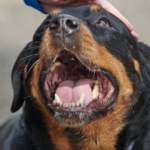Do you want to add a purebred Rottweiler to your family? It is important to be aware of the potential health problems that may occur in this breed. Responsible breeding is important in safeguarding the health of these beloved dogs, from hip dysplasia to bloat. In this article, we will look at the unique health problems that purebred Rottweilers experience and explain how breeders might manage these issues. So, let’s get started and discover more about how to keep your purebred Rottweiler healthy.
Common Health Problems associated with purebred Rottweilers
Purebred Rottweilers can be prone to specific health problems. Hip dysplasia, elbow dysplasia, bloat, and osteosarcoma are some of the most frequent medical problems. These health problems may be the result of a combination of genetic and environmental causes. Responsible breeding may help lessen the occurrence of certain health problems in purebred Rottweilers. Rottweiler owners must be aware of these health risks and collaborate with their vets to ensure their pets get adequate care and treatment. Understanding the frequent health problems that affect them allows owners to take proactive efforts to keep their pets healthy.
Role of Genetic Testing in identifying potential Health Risks
Genetic testing is necessary for detecting possible health problems in purebred dogs such as Rottweilers. Breeders may identify dogs at an elevated risk of certain health concerns and make educated breeding choices by testing for certain genetic markers. Genetic testing may help detect carriers of Rottweiler-specific disorders such as hip dysplasia, elbow dysplasia, bloat, and osteosarcoma. This enables breeders to make educated decisions about which dogs to breed and which to spay or neuter, lowering the incidence of certain diseases in the breed. It may also assist Rottweiler owners in making informed decisions about their dogs by identifying possible health problems that may need further monitoring or preventative treatment. Genetic testing is a crucial technique in Rottweiler breeding that may eventually enhance the breed’s health and well-being.
Tips for Early Detection and Prevention of Health Problems in purebred Rottweilers
Preventing and detecting health problems in purebred Rottweilers is important to their well-being. Regular veterinary check-ups and screenings may assist in the early detection of any problems before they become more severe. As previously stated, genetic testing may help uncover possible health problems. Furthermore, Rottweiler owners should be aware of the breed’s prevalent health issues and search for indicators such as lameness, trouble rising, and stomach distension, which may be indicative of hip dysplasia, elbow dysplasia, and bloat.
Proper diet and exercise may also help Rottweilers avoid health concerns. Maintaining a healthy weight and eating high-quality food may help lower the risk of joint problems and obesity-related illnesses. Regular physical activity, like walks and plays, may also help Rottweilers stay fit and healthy. Finally, good breeding techniques, like as genetic testing and careful breeding stock selection, may help lower the occurrence of health problems in purebred Rottweilers.
Role of responsible ownership in maintaining purebred Rottweiler’s Health
Responsible Rottweiler ownership is essential for the well-being of purebred Rottweilers. Rottweiler owners may help avoid and diagnose any health problems by offering regular veterinary check-ups, a good diet, and regular exercise. Furthermore, being aware of the breed’s typical health issues and watching for indicators of these illnesses will help ensure that Rottweilers get prompt and proper treatment. Owners of Rottweilers should be aware of the significance of genetic testing in detecting possible health issues and should choose breeding stock appropriately. Responsible breeding procedures, such as genetic testing, may help minimize the occurrence of health problems in purebred Rottweilers. Regular dental care, grooming, and parasite treatment are all important in keeping your Rottweiler healthy. Regular teeth cleaning and dental care may help avoid dental difficulties, regular grooming can help maintain a healthy coat and skin, and keeping the dog parasite-free can help prevent linked health problems.
The Bottom Line
In conclusion, keeping a purebred Rottweiler entails a great deal of responsibility. Rottweiler owners must be aware of the breed’s common health problems and work closely with vets to ensure their pets get adequate care and treatment. Responsible breeding procedures may help minimize the occurrence of health problems. Finally, preventive care is essential for the longevity of this cherished breed.







